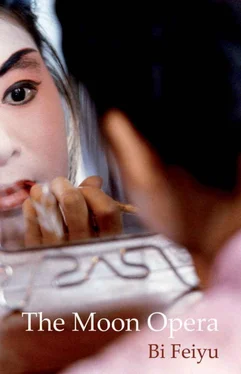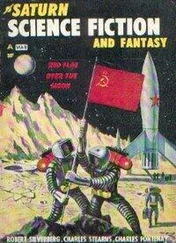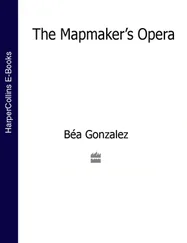Good fortune smiled on Chunlai; everything, it seemed, had been prepared for her beforehand. She may have been a Chang’e understudy, but no one could deny that the spiritual light of the Erlang deity shone brightly down on her.
Songs are the primary element of Peking Opera. To speak the lyrics is commonly called narrating an opera. The performer atomizes the narrative, turns it into countless fragments and details and transforms the character’s emotion, be that anger, happiness, pain, or melancholy into a word, a smile, glance, or a flinging of the water sleeves, and then folds these all back into the performance as a monologue, an aria, a recitation, or a stylized gesture. Only after these have been reassembled and molded into alternating spoken and sung lines can the actual rehearsals begin. First comes the ensemble rehearsal. An opera is not the work of one person alone; it is, first and foremost, a study in interpersonal relations. With so many performers crowded onto a stage, they must learn to communicate, to cooperate, to exchange ideas, and to take others into consideration. This carefully conducted process is the ensemble rehearsal. But it does not end there. The performers also need to develop a connection with the orchestra, with the gongs, the drums, and other instruments. How could anything called “opera” exist without the winds, the strings, and the percussions? Bring all the instruments together, and you have what is called the sound rehearsal. But there is yet more, the dress rehearsal, which approaches an actual public performance, as the actors play to a virtual audience. The headdress must be worn, the face must be painted, and everyone plays a part as if it were a real performance. Only when that is done can the curtain for the big show be raised.
Nearly everyone noticed that from the first day of opera narration, Xiao Yanqiu appeared to be trying a bit too hard, working too much. She had kept up with her routine, but she was, after all, a forty-year-old woman who had been away from the stage for two decades. Her unyielding work ethic, in contrast to the rashness of the young, was like a river, flowing east in the spring and displaying defiance and dignity. Yet it was hopelessly clumsy, with giant eddies and swirls that fought to turn back at the moment of merging with the ocean. It was an exhausting struggle, presenting the illusion of swimming against the tide, an involuntary downward slide, an unstoppable flow. Truly the passage of time is like water seeking lower ground; no matter how hard you try, the sad reality is that spilled water cannot be recovered. You strain to drag the ox by the tail, only to end up having it pull you into the water.
By the time of the opera narration, Xiao Yanqiu had successfully shed ten pounds. She was not losing weight so much as clawing it off, with earnestness and considerable pain. It was a battle of stealth, devoid of gunpowder, but producing significant casualties nonetheless. Her body was now her enemy, and she carpet-bombed it with an avenging madness, all the while closely monitoring the situation. During those days, she was not only a bomber jet, but also an accomplished sniper, as, rifle in hand, she watched her body closely. It was her ultimate target, and she unflinchingly pulled the trigger whenever the slightest movement caught her attention. She stepped on the scales each night to see if she had met the strict, self-imposed demand of daily weight loss. She was determined to claw off twenty-five pounds, returning to her weight of twenty years before, for she was convinced that, so long as she shed those twenty-five pounds, her life of that period would return. The morning light of those days would once again cast her peerless figure onto the earth.
It was a long, cruel battle. Liquids, sugar, lying down, and hot foods are the four enemies of weight loss. For Yanqiu eating and sleeping were the magic words. She tackled sleep first, allowing herself only five hours a night; beyond that, she neither slept nor sat. Then she attended to what she put into her mouth. Neither rice nor water was allowed, especially hot water. All she ate were fruits and vegetables. Beyond that, like the insatiable Chang’e, she swallowed large quantities of pills.
Results were easy to come by at first. Her weight plummeted like stocks in a bear market. She lost the fat, but gained skin, which, like a found purse, hung from her body limply. This extra skin gave the illusion that she was more form than content. It was a strange impression, one both comical and loathsome. Worst of all, it showed most in her face. It gave her a widow’s mien; staring at her reflection in the mirror, she felt every bit as dejected and despairing as a widow might.
But the true despair was yet to come. Once she began to see the results of her weight loss regimen, she suffered from lightheadedness, a clear sign of malnutrition. She was becoming lethargic, was often dizzy and fatigued, grew anxious, and suffered from nausea and a lack of energy. With all this came a notable weakening of her voice. After the opera narration was behind them, preparations entered the dry-run stage, which meant an even greater depletion of energy. Her voice lost its power and sounded less steady, a bit shaky. As her breathing faltered, she had to tighten her vocal cords and, as a result, she sounded less and less like Xiao Yanqiu.
It never occurred to Yanqiu that she would one day make a fool of herself, and in front of so many people. While demonstrating a particular sequence for Chunlai, she tattooed her voice; in plain language, she croaked. Nothing is more embarrassing to someone who makes a living with her voice. What emerged sounded like the scratching of glass on glass or a hog on the back of a sow, not something that had come from a human throat. Every performer’s voice tattoos once in a while, but Xiao Yanqiu wasn’t just any performer, and she was mortified by all the eyes fixed on her. For her, those looks were not knives; no, they were poison, which draws no blood and causes no pain as it takes your life. She decided she must save face, that she had to recapture her dignity in front of them all. So, taking a deep breath to calm herself, she signaled to start over. But twice more she tried, and twice more she failed. Her throat itched horribly, as if a swarm of tiny bugs were crawling over it. She felt a cough rising in her throat, but managed to swallow it through sheer steeliness of will. Bingzhang, who was sitting off to the side, brought her a glass of water and, in an attempt to sound casual, said, “Here, take a break. Let’s all take a break.” But she refused the offer; to accept the glass at that moment would have been so unlike her. Turning to the performer in the role of Houyi the Archer, she said, “Let’s try it again.” This time she did not tattoo her voice, but only because she stopped before reaching for the high notes. Releasing a long sigh, she stood frozen.
No one dared come talk to her, no one dared even look at her. She forced herself to remain collected, but that too took its toll. People should never be too anxious to recover their dignity after a blunder; sometimes, the more they try, the greater the loss. Yanqiu swept her eyes over the people around her, but they seemed to have reached a tacit agreement to pretend that nothing had happened. This felt like a conspiracy, as cruel as an open accusation. She wanted to give it one more try, but her courage had left her. Bingzhang held up his glass and announced loudly, “Your teacher has a cold, so we’ll stop here. We’re done for the day.” Xiao Yanqiu looked at him with teary eyes, fully aware of his good intentions; but what she felt like doing was rushing up, grabbing him by the collar, and giving him a couple of resounding slaps.
The room emptied out quickly, leaving only Xiao Yanqiu and Chunlai. Not daring to look at her teacher, Chunlai bent down and pretended to gather up her things. As she fixed her eyes on her student, Xiao Yanqiu marveled at the lovely profile, and at the girl’s cheeks and chin, which held a luster normally seen only on fine china. She was lost in thought, as she silently repeated the question: Why don’t I have that kind of good fortune?
Читать дальше












